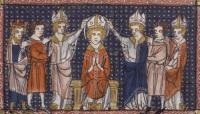
Feast day: 13 January
Hilary was born in Poitiers, around the end of the third or beginning of the fourth century. His pagan parents were noble and wealthy. He received a good education, which included Greek at a high level. Later on he studied the writings of the Old and New Testaments, which led him to move from Neoplatonism to Christianity. He was baptized with his wife and his daughter, St Abra, who became a nun.
Arianism, the belief that denied the divinity of Christ, was popular among Christians at this time and Constantine leaned towards this theology in his later years. There were battles between Trinitarians and Arians. In 353 the Trinitarian Christians elected Hilary as bishop, as the existing bishop, Saturninus of Arles, was an Arian. At the Council of Arles, the legates of Pope Liberius refused to condemn Arianism and considered formally opposing Athanasius of Alexandria, who strongly opposed Arianism. Hilary managed to excommunicate Bishop Saturninus and two of his supporters, with the help of the Gallican hierarchy, who were Hilary’s allies.
Hilary wrote to Constantius II to protest about the persecution by the Arians of their opponents. However at the synod of Biterrae, summoned by the emperor to settle the dispute, Hilary was banished to Phrygia (Turkey), a stronghold of Arianism. He spent nearly four years there, though he continued to govern his diocese. He also wrote two important epistles: the De synodis or De fide Orientalium, written to the Semi Arian bishops in Gaul, Germania and Britain, analysing the views of the bishops on the Nicene controversy (Semi Arians modified Arianism but denied Christ’s divinity). In reviewing the professions of faith of the oriental bishops at the Councils of Ancyra, Antioch and Sirmium, Hilary sought to show that sometimes the difference between certain doctrines and orthodox beliefs was in the words rather than the ideas, which led to his advising the bishops of the west to be more reserved in their condemnation. De Trinitate libri XII, composed between 359 and 360, expressed in Latin the theological subtleties of the Council of Nicaea, originally written in Greek.
Hilary attended several synods during his time in exile, including the council at Seleucia (359). This saw the triumph of the party that believed that Jesus is like the Father but subordinate to him. The Council was deeply divided between those who adhered to this position and those who upheld the doctrine of Nicaea, which maintained that the Son is of the same substance as the Father. The adherents of the former stance were supported by the Emperor Constantius II. Hilary tried unsuccessfully to meet the Emperor and to address the Council of Constantinople, which met in 360 and ratified the decisions of Seleucia. Hilary responded bitterly with In Constantium, where he attacked the Emperor as antichrist and persecutor of orthodox Christians. His repeated requests for debates with his opponents caused so much annoyance that he was sent back to his original diocese, which he seems to have reached in about 361, about the time of the accession of the Emperor Julian.
When he returned to his diocese he spent the first few years trying to turn the local clergy away from any taint of Arianism. In 360 or 361 with his encouragement, Martin, the future bishop of Tours, founded a monastery at Ligugé in his diocese. Hilary impeached Auxentius, bishop of Milan, accusing him of heterodoxy. The Emperor, Valentian I, summoned Hilary to Milan to maintain his charges. He defended Auxentius and Hilary had to return, unsuccessful in his mission.
According to Jerome, Hilary died in 367. Hilary was influenced by Origen and Athanasius but his writing shows independent thought. Among his earliest writings, completed before his exile in 356, are his commentaries on Matthew, an allegorical exegesis of the gospel. It is the first Latin commentary on Matthew to have survived in its entirety. It was influenced by Tertullian and Cyprian and made use of many Roman writers and historians. His exposition (sermons) of the psalms were composed sometime after Hilary returned from exile in 360. Some commentaries are extant. Another exegetical writing is the Tractatus mysteriorum, preserved in a single manuscript. His major work, however, was the twelve books now known as De Trinitate.
Some consider Hilary as the first Latin Christian hymn writer, which was the opinion of St Jerome. He was the pre-eminent Latin writer of the 4th century and his works were influential. The spring terms of the English and Irish law courts and the Oxford and Dublin universities are called the Hilary term, as they begin around his feast day.
St Hilary of Poitiers, pray for us.